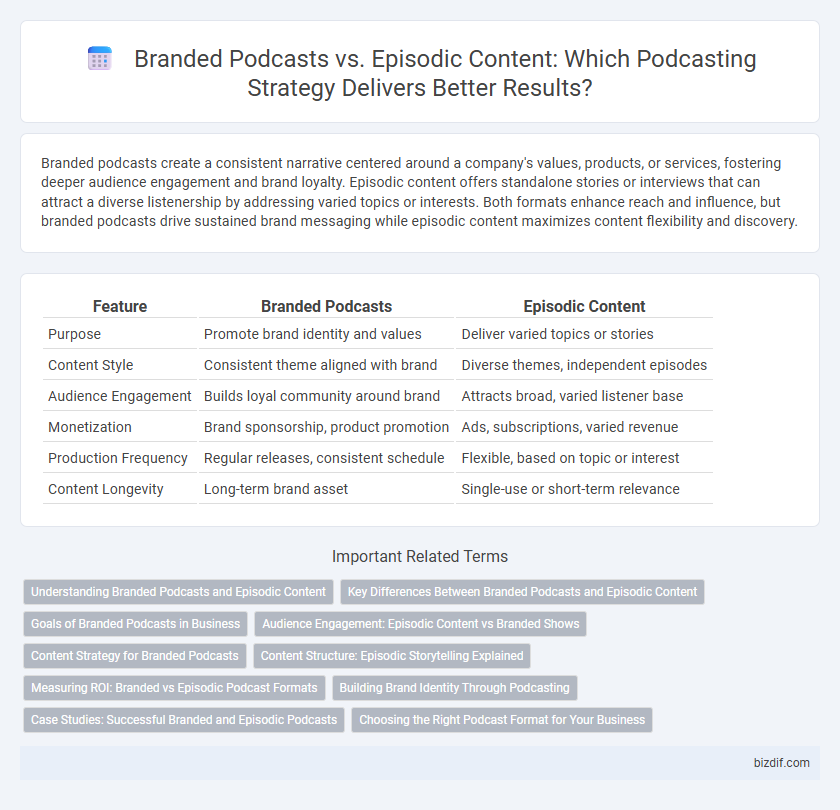Branded podcasts create a consistent narrative centered around a company's values, products, or services, fostering deeper audience engagement and brand loyalty. Episodic content offers standalone stories or interviews that can attract a diverse listenership by addressing varied topics or interests. Both formats enhance reach and influence, but branded podcasts drive sustained brand messaging while episodic content maximizes content flexibility and discovery.
Table of Comparison
| Feature | Branded Podcasts | Episodic Content |
|---|---|---|
| Purpose | Promote brand identity and values | Deliver varied topics or stories |
| Content Style | Consistent theme aligned with brand | Diverse themes, independent episodes |
| Audience Engagement | Builds loyal community around brand | Attracts broad, varied listener base |
| Monetization | Brand sponsorship, product promotion | Ads, subscriptions, varied revenue |
| Production Frequency | Regular releases, consistent schedule | Flexible, based on topic or interest |
| Content Longevity | Long-term brand asset | Single-use or short-term relevance |
Understanding Branded Podcasts and Episodic Content
Branded podcasts are strategically designed audio series that promote a company's brand identity, products, or services through storytelling and consistent messaging. Episodic content, in contrast, features standalone episodes focusing on varied topics, allowing for flexible listening without requiring sequential order. Understanding these formats helps marketers decide between deep brand integration or broader topic exploration to engage specific audiences effectively.
Key Differences Between Branded Podcasts and Episodic Content
Branded podcasts are strategically created to promote a company's identity, products, or services, integrating marketing messages seamlessly within engaging narratives. Episodic content prioritizes standalone stories or topics that attract and retain a broad audience without direct promotional emphasis. Key differences include the primary goal--brand awareness and loyalty for branded podcasts versus entertainment and information for episodic content--and the content structure, with branded podcasts often following thematic series tied to brand values, while episodic content varies widely in format and subject matter.
Goals of Branded Podcasts in Business
Branded podcasts aim to strengthen brand identity and foster deeper customer engagement by delivering targeted storytelling aligned with business values. These podcasts generate loyal audiences and drive brand awareness through consistent, high-quality content tailored to specific market segments. Metrics such as listener retention, conversion rates, and brand sentiment serve as key indicators of their success in achieving marketing and sales objectives.
Audience Engagement: Episodic Content vs Branded Shows
Episodic content fosters sustained audience engagement through consistent storytelling and character development, encouraging listeners to return for each new episode. Branded podcasts leverage company identity and targeted messaging to create a loyal community around specific products or values, enhancing brand affinity. While episodic shows build long-term listener habits, branded podcasts drive deeper emotional connections by aligning content with audience interests and brand purpose.
Content Strategy for Branded Podcasts
Branded podcasts prioritize consistent messaging aligned with the company's core values and product offerings to enhance audience loyalty and brand recognition. Content strategy for branded podcasts involves crafting targeted episodes that deliver value and foster emotional connections while subtly promoting the brand's mission. This approach contrasts with episodic content, which typically focuses on standalone stories or topics without sustained brand messaging integration.
Content Structure: Episodic Storytelling Explained
Episodic storytelling in podcasting employs a structured narrative arc across multiple episodes, fostering listener retention through cliffhangers and recurring themes. Branded podcasts integrate episodic content to align storytelling with brand messaging, creating immersive experiences that resonate emotionally with target audiences. This approach contrasts with standalone episodes by building sustained engagement and reinforcing brand identity over time.
Measuring ROI: Branded vs Episodic Podcast Formats
Measuring ROI in branded podcasts often involves tracking brand awareness, audience engagement, and direct conversions linked to marketing campaigns, leveraging detailed analytics and listener feedback to assess effectiveness. Episodic podcast formats prioritize long-term listener retention and growth metrics such as downloads, subscriber trends, and social sharing to evaluate sustained content value. Comparing these, branded podcasts provide more immediate, measurable returns tied to specific brand objectives, while episodic content drives organic audience development and deeper loyalty over time.
Building Brand Identity Through Podcasting
Branded podcasts create a cohesive audio experience that deeply embeds a company's values and messaging, fostering stronger emotional connections with the audience. Episodic content, while flexible and diverse, may dilute brand identity due to its varied topics and inconsistent storytelling. Consistent branded podcasting enhances brand recognition and loyalty by delivering targeted narratives aligned with core brand themes.
Case Studies: Successful Branded and Episodic Podcasts
Branded podcasts like GE's "The Message" demonstrate how integrating company values with storytelling drives listener engagement and brand loyalty. Episodic podcasts such as "Serial" showcase the power of ongoing narrative arcs to build suspense and maintain a dedicated audience over multiple seasons. Case studies reveal that successful branded podcasts balance content marketing goals with entertainment, while episodic formats excel in deepening audience connection through serialized storytelling.
Choosing the Right Podcast Format for Your Business
Branded podcasts create a consistent narrative aligned with a company's values, driving deeper audience engagement through targeted storytelling and brand loyalty. Episodic content offers flexibility with varied topics, appealing to a broader audience and fostering regular listener retention through diverse, standalone episodes. Selecting the right podcast format depends on business goals, audience preferences, and whether the focus is on establishing brand identity or expanding reach through varied content.
Branded Podcasts vs Episodic Content Infographic

 bizdif.com
bizdif.com